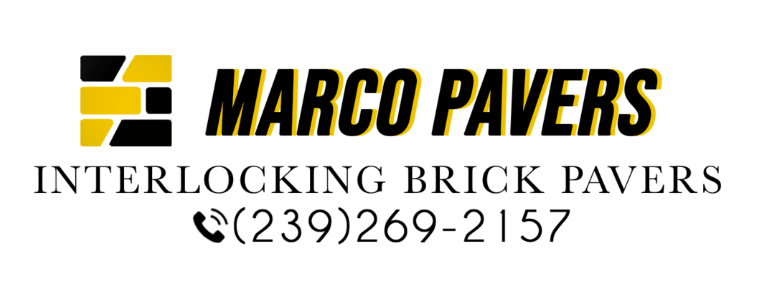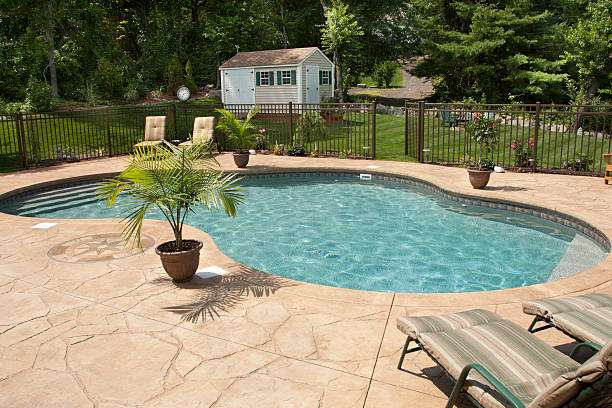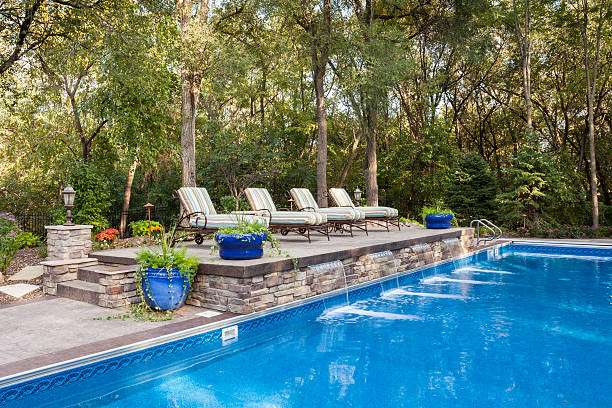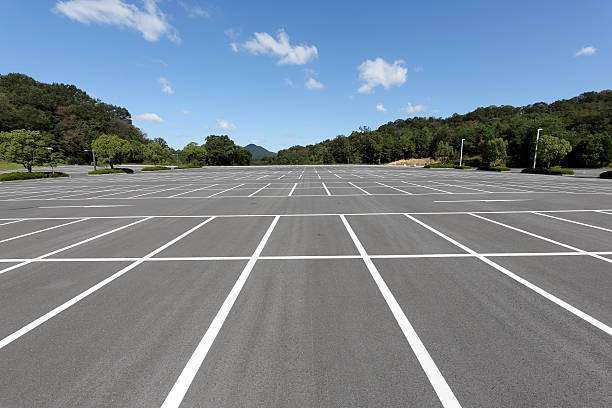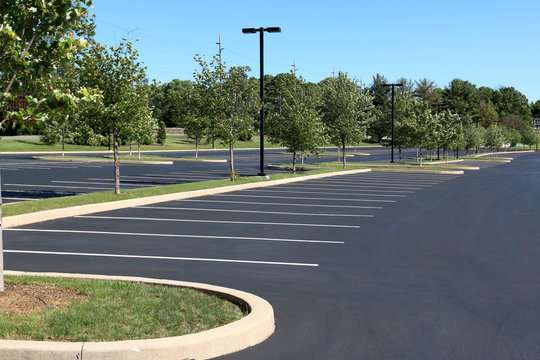WHAT WE DO:
Design and Repairs
Paver Driveway
Paver Patio
Pool Deck
Retaining Wall
Pervious Pavers Installation
Paver Driveway:
Types of Driveway Pavers
As mentioned, there are many options available when we work with you to design your paver driveway. You can select the style of paver that best fits your home and personal preferences. Below are some of the best paver options available.
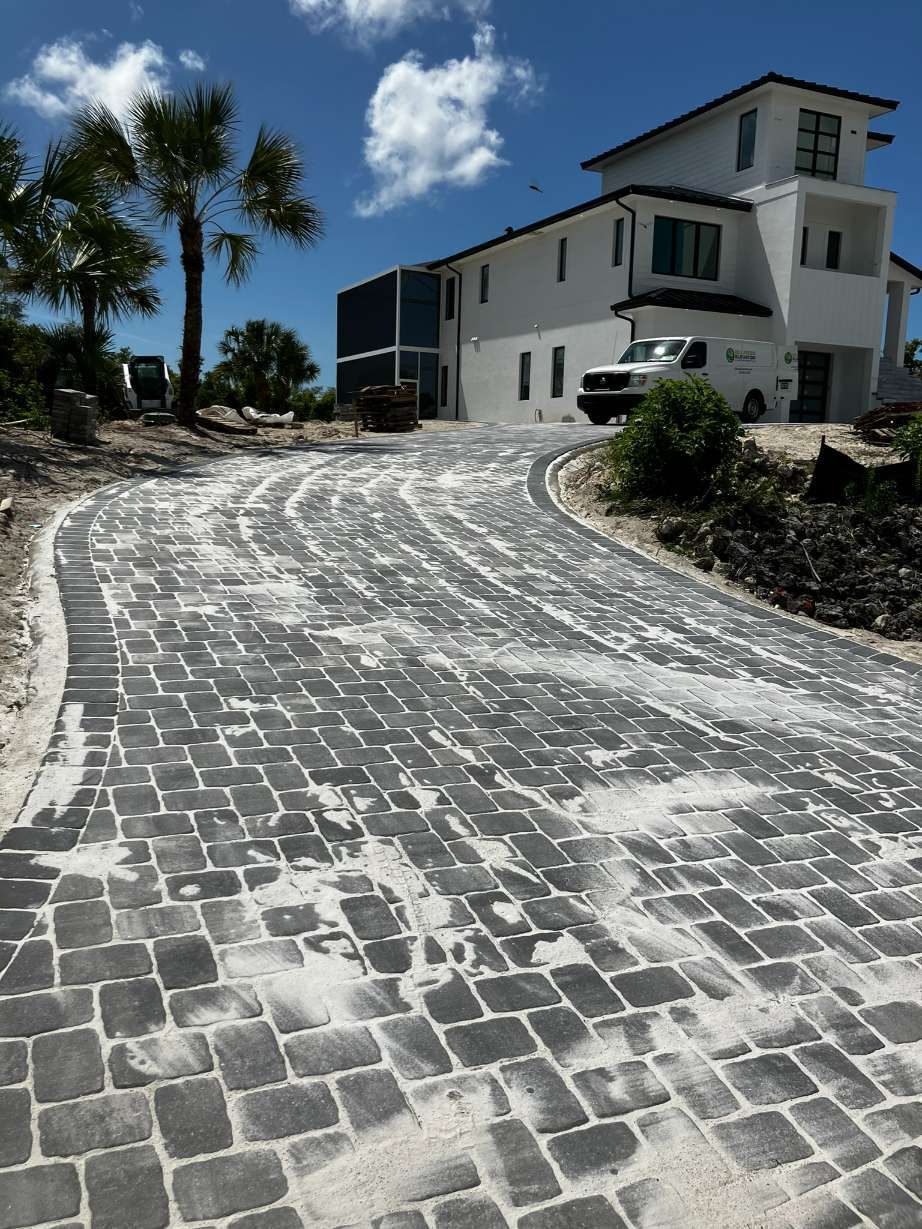
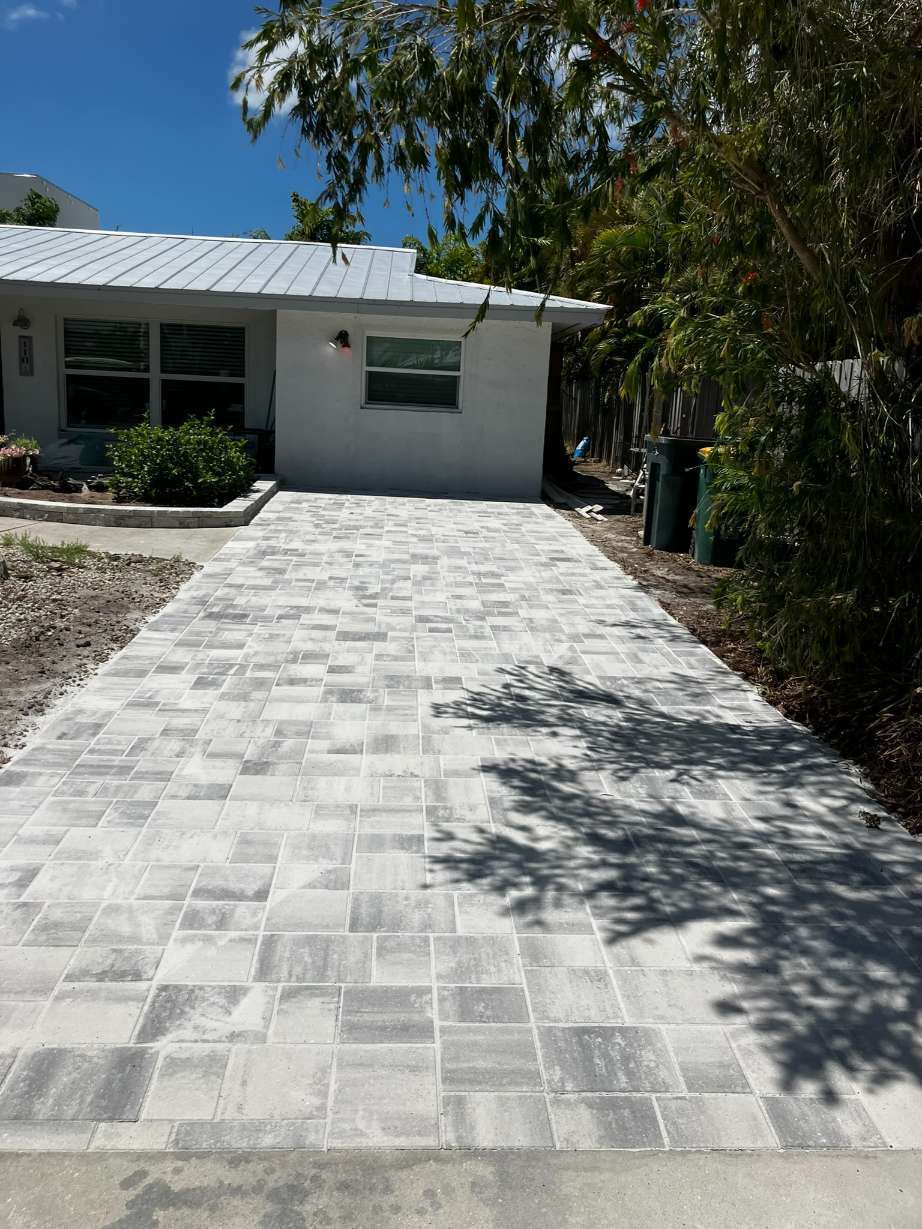
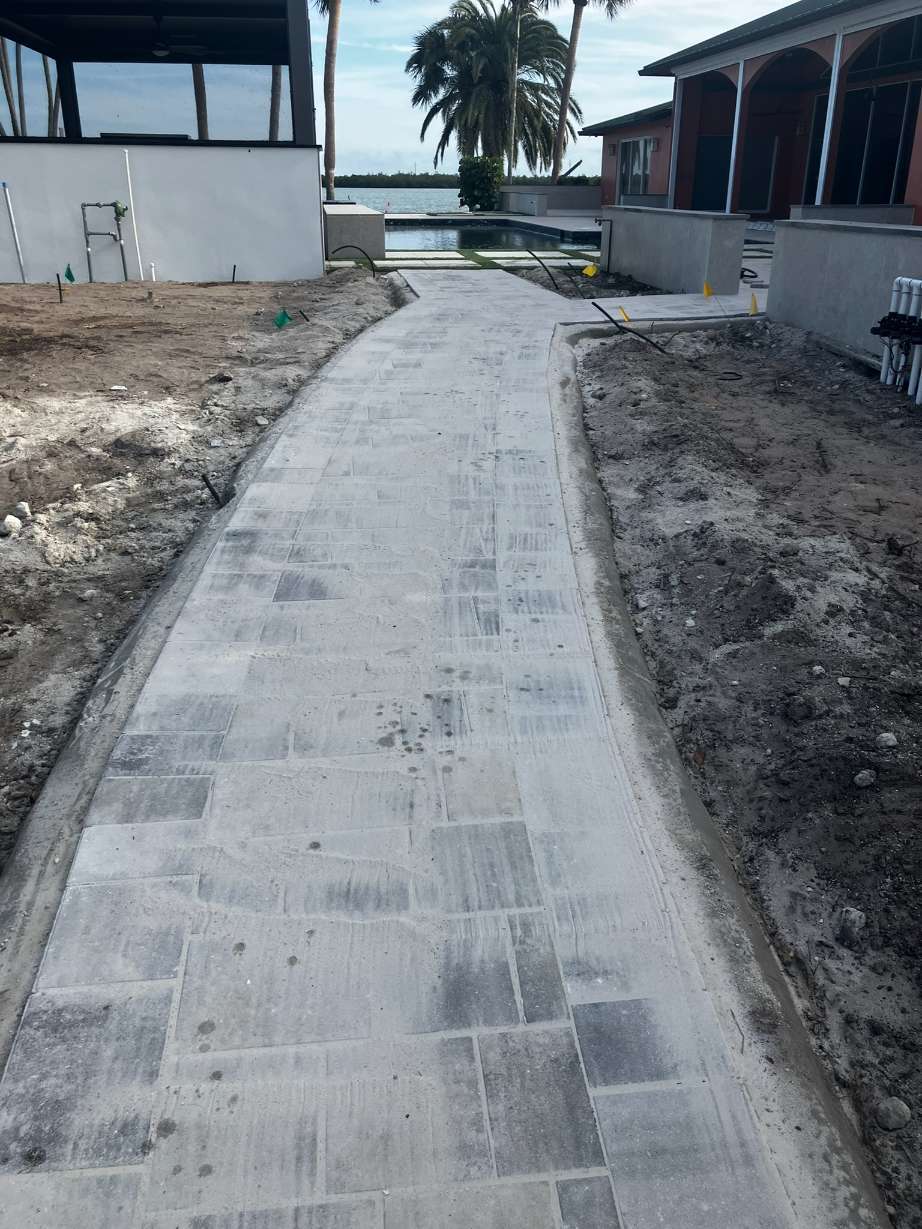
Brick Driveway
Brick pavers are made of heat-cured clay and are typically rectangular shaped. Brick pavers are available in many different colors. Brick driveways typically last 2.5 to 3 decades. They can give your driveway a vintage, rustic look, or a sleek modern appeal.
Interlocking Driveway Pavers
These pavers offer a lot of flexibility, with many different shapes and colors to choose from. They tend to look like natural stone. They can last up to 5 decades with little maintenance.
Concrete Driveway Pavers
Concrete driveway pavers speak for themselves – they are pavers made of concrete. Concrete driveway pavers can last from 2.5 to 5 decades.
Paver Stone Driveway
Paver stone driveways can provide great drainage and are extremely durable.
Driveway Paver Repairs
Depending on the land underneath your paver driveway, your driveway may need to undergo repairs over time. The land underneath your driveway will naturally settle, shift, and erode. With an asphalt or concrete driveway, this shifting will lead to cracks that are difficult to repair. Paver driveway repairs are not nearly as difficult.
To repair for natural paver settlement, you will need to put sand underneath the sunken pavers. It’s best to allow our team of professionals at Marco Pavers to make the repairs, as we can ensure that the pavers will be level and fit properly again.
Mother nature can disrupt your paver driveway in more ways than one – you may have to account for root repairs during the lifespan of your paver driveway. Root repairs are required when nearby trees or bushes grow underneath your driveway and lift the pavers up. The best way to avoid root repairs is to remove any nearby trees or bushes that may cause problems down the road prior to the installation of your driveway. When we initially lay your paver driveway, our experts will advise what plants could cause issues down the road. If you do have to perform a root repair, you will need to dig below the pavers and remove the root that has become troublesome.
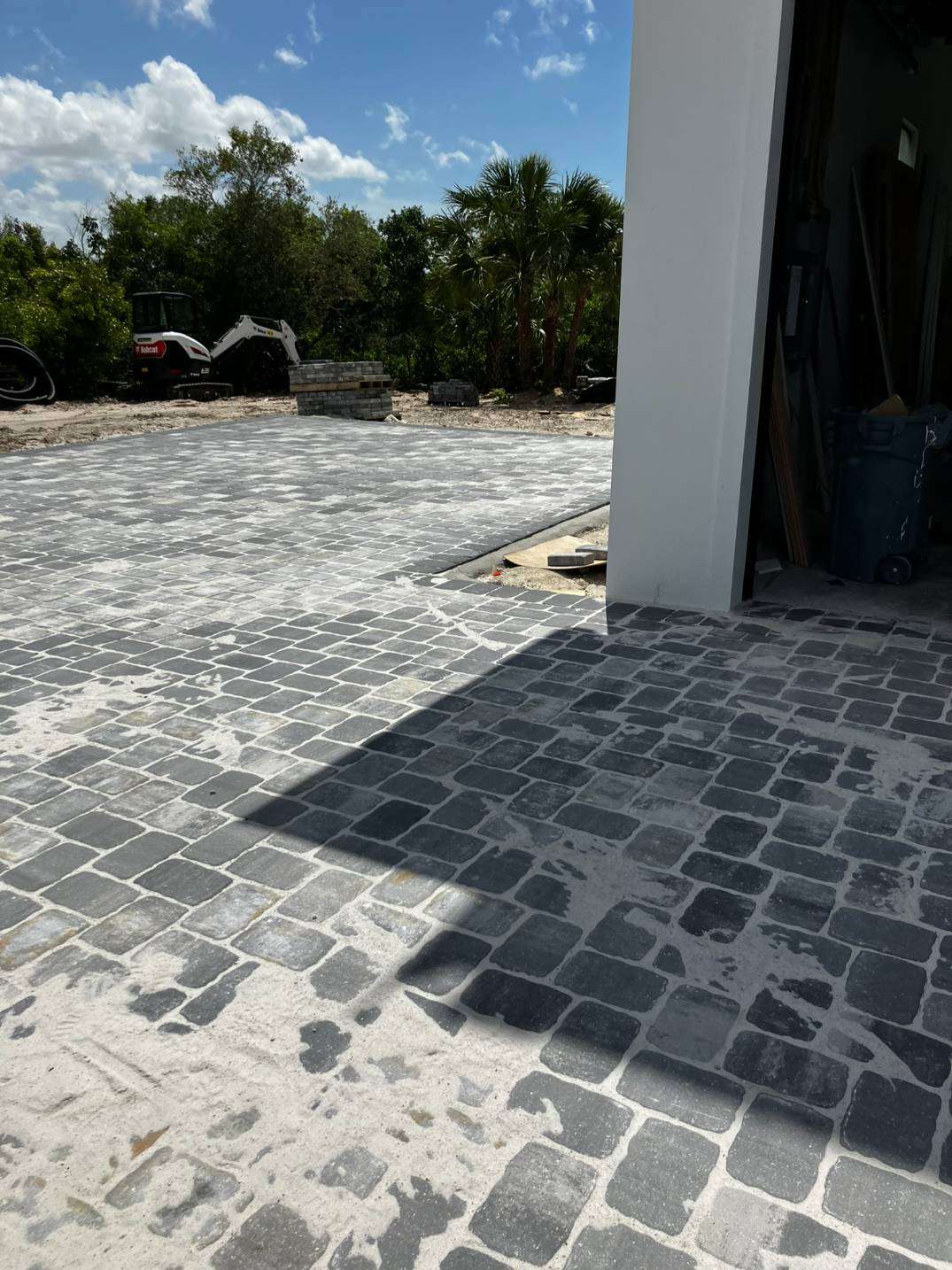
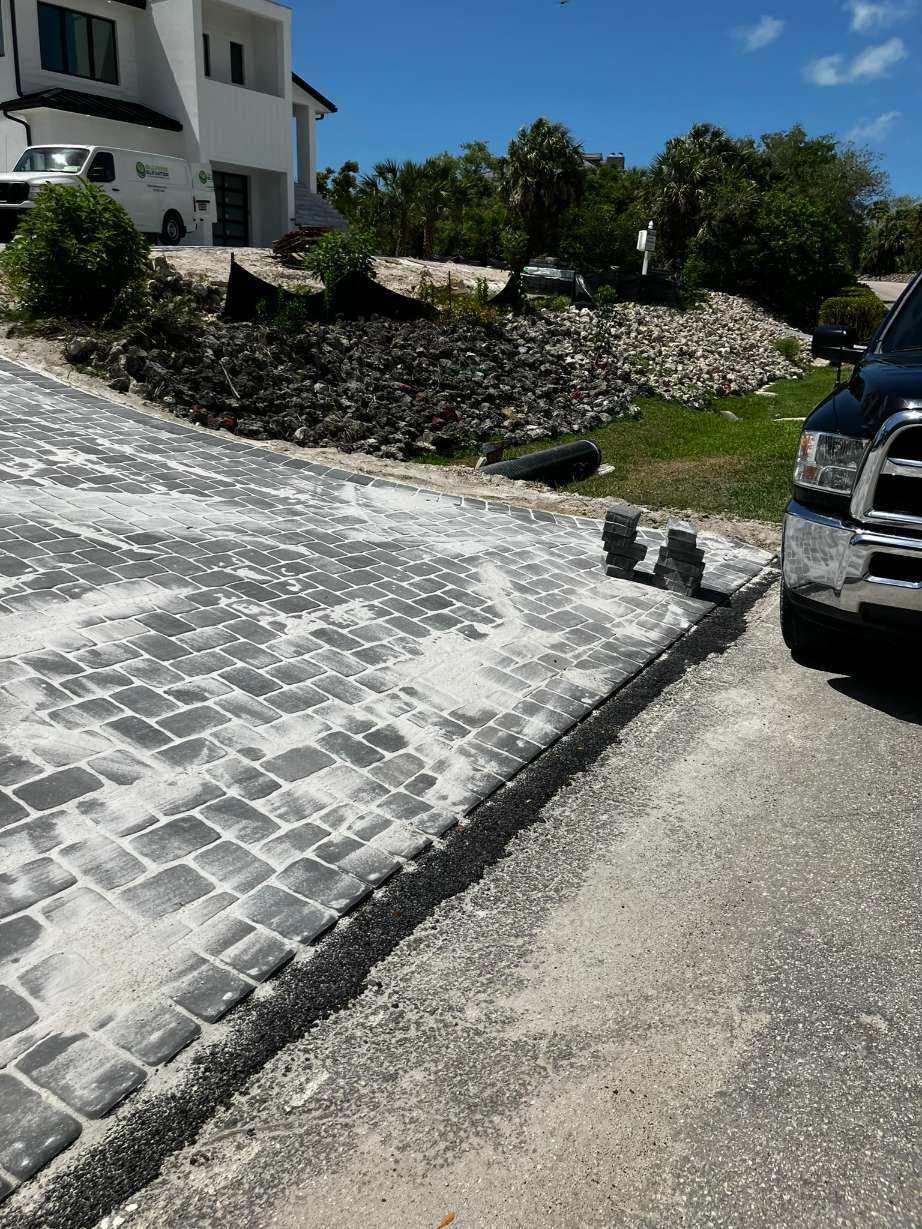
Commercial And Residential Driveway Pavers
The beauty and durability offered by driveway pavers means that they make a great option for both commercial and residential properties.
If you are a business owner, you should consider pavers to spruce up your commercial driveway or walkway with a material that will not only wow your customers, but will also stand up to the test of time and continual traffic it will receive. Your customers’ first impression of your business can be your stunning paver driveway.
The same can be said for residential owners. If you truly wish for your home to the most beautiful on your block as you continually wow houseguests, add a paver driveway to your yard today.
At Marco Pavers, we pride ourselves on our outstanding quality and design. Whether you are looking for a commercial or residential paver driveway, Marco Paving can provide exactly what you are looking for.
Paver Patio Design:
With many types of paver patterns available, paver patio design possibilities are endless. You can blend colors together to create a natural look with your stone paver designs. Doing so will help your patio blend seamlessly into your home, instead of giving off a patchwork appearance. Additionally, because the pavers themselves are less than a foot long, you have the flexibility to create a patio that is any size or shape.
When creating your paver design, you should be conscious of any plumbing, cable, or electrical lines that may cause a problem once you begin digging. You should also plan to have proper drainage on your new patio. Installing patio pavers is not difficult, as long as you properly lay out the design beforehand. Some pavers may need to be cut to create the perfect fit. Our team at Marco Pavers will be able to help advise you on the potential trouble you may run into while laying your patio pavers.


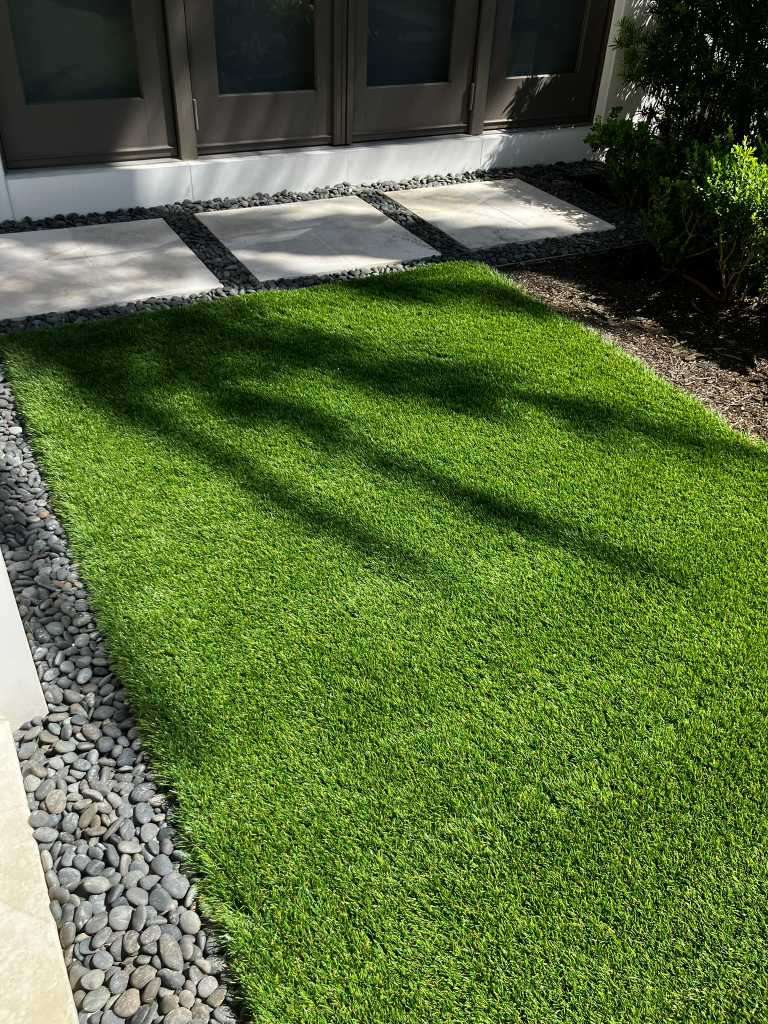
Types of Patio Pavers
There are many types of patio pavers and options available to help create the perfect look for your backyard or walkway.
Brick Patio
Brick patios are a great way to create a rustic, vintage look in your backyard. Brick pavers are very strong and resistant to stains.
Paver Edging
Paver edging can be used to create a crisp, solid edge for your entire patio. Doing so will also prevent shifting and movement, assuring your patio stays in place.
Interlocking Patio Pavers
This form of installation is ideal because of how easy the pavers are to maintain. Interlocking patio pavers do not require mortar to create a tight fit, meaning they are easy to install and even easier to repair.
Garden Paving
Creating a walkway or sitting area is a great way to make your garden stand out. Providing garden paving via a stone patio can highlight or complement your backyard plants.
Concrete Patio
Concrete pavers can be dyed to create many different colors that will perfectly fit your patio. Concrete patios are remarkably durable.
Stone Patio
Stone patios typically come in flagstone or fieldstone. Stone patios are incredibly beautiful, but are not as durable as brick or concrete patios.
Patio Tiles
Patio tiles can be used to create a unique, personalized look that allows your patio to become an extension of your home. With options from wood, to stainless steel, to everything in between, the options are endless when choosing patio tiles.
You should be open and upfront with our design team to help ensure you get the exact style of pavers you are looking for.
Paver Patio Cost
Your patio paving cost will depend on how large your patio is. Prices vary based on the number of pavers used, so the more pavers you use, the more your cost will be. Other factors to consider when determining how much your paver patio will cost include the location and difficulty of the project. Is the project in a tight area that is difficult to maneuver? Will plumbing or electrical lines need to be moved? Will pavers need to be cut and rounded to create a curved edge? These will all factor into your paving prices.
Fortunately, however, paver patio costs are cheaper than other patio options. Decking especially is more expensive than pavers. If you are looking for a more accurate cost projection, allow us to provide you with a free quote today.
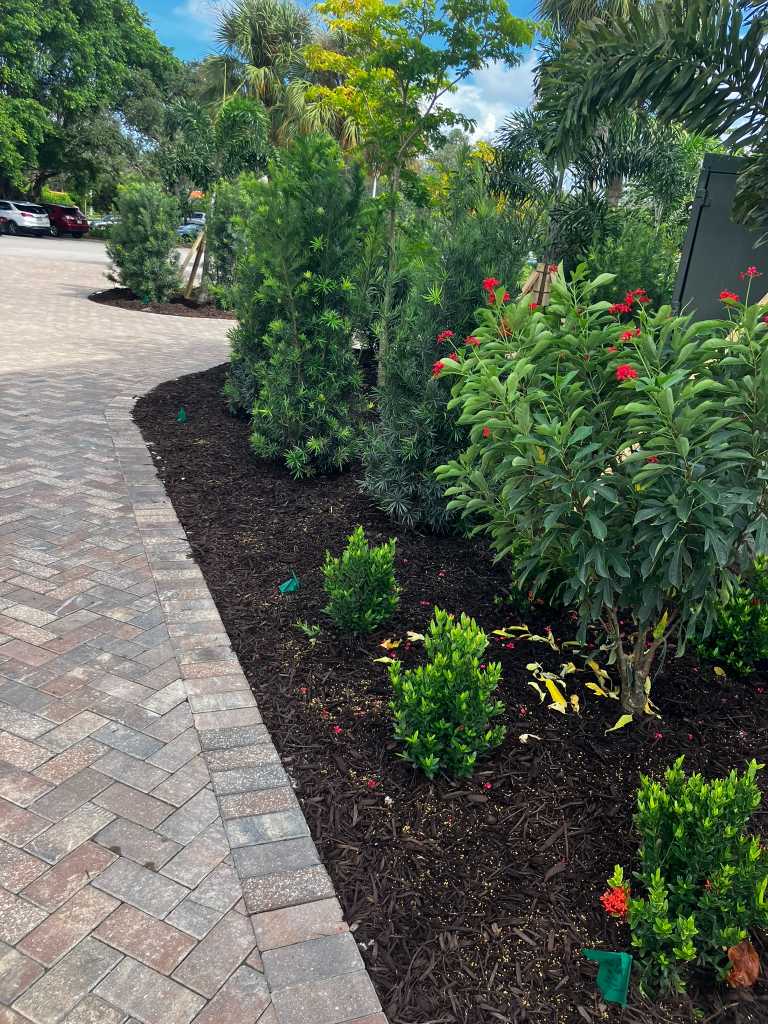
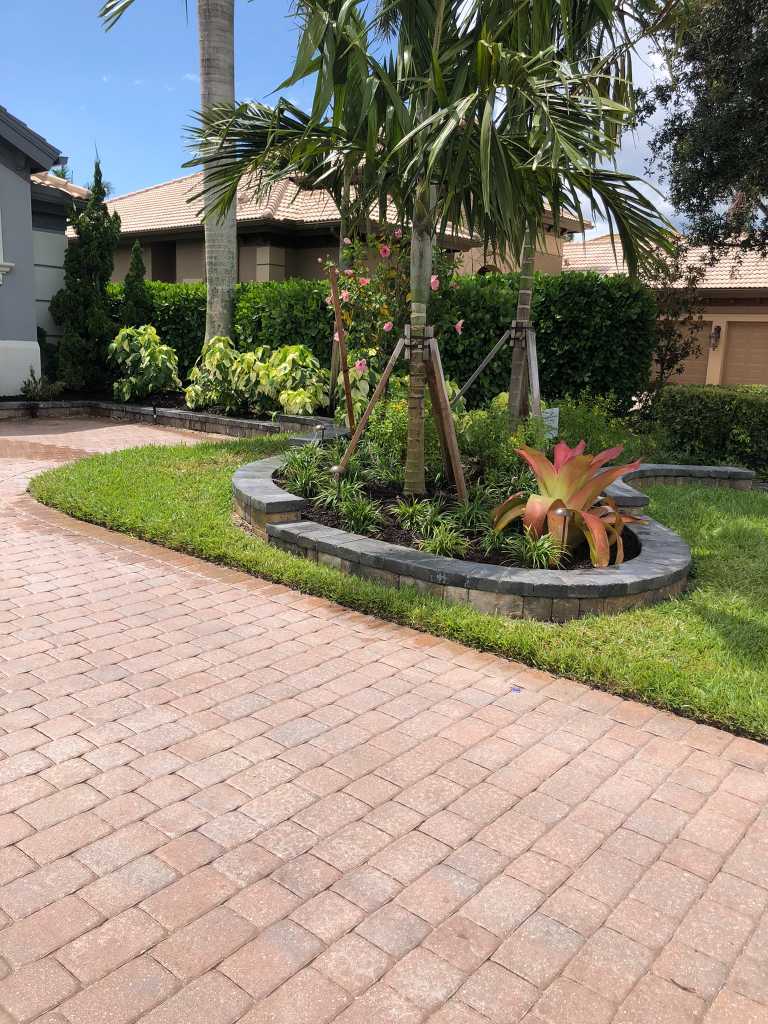
Patio Paver Repairs
Fortunately, pavers are one of the easiest materials to maintain. When completing your paver patio, you should keep extra pavers on hand to make your future repairs easier. Although pavers are incredibly durable, they can occasionally crack after years of being exposed to the elements. At Marco Pavers, we can easily remove and replace broken pavers.
When initially laying your patio, you should take measures to prevent weeds and other vegetation from growing underneath your pavers. Failure to do so could create the need for a root repair. This occurs when the roots of a plant, tree, or weed grow underneath your pavers and push your pavers up, creating an uneven surface.
Natural shifting of the ground beneath your pavers should also be expected. This is unavoidable. If this were to occur with a patio that is of solid material, significant cracks and dangerous structural changes could occur. Fortunately, with pavers, this problem is easy to fix by removing the individual paver and repacking in the sand beneath it until it is level with the rest of the patio. Paver settlement will occur naturally over time, but is a quick fix compared to having to replace your entire patio!
Pool Deck Design:
Your pool deck design is an important aspect of your backyard oasis. You will be spending a lot of time out here, so coming up with a design that you are satisfied with will make the entire process much more enjoyable.
When constructing your pool deck, Marco Pavers will use a basic installation overview, which goes as follows:
Survey the land, and mark where the project will be completed.
Excavate the land
Lay and level the base layer
Place the pavers
Seal and tamp the entire patio
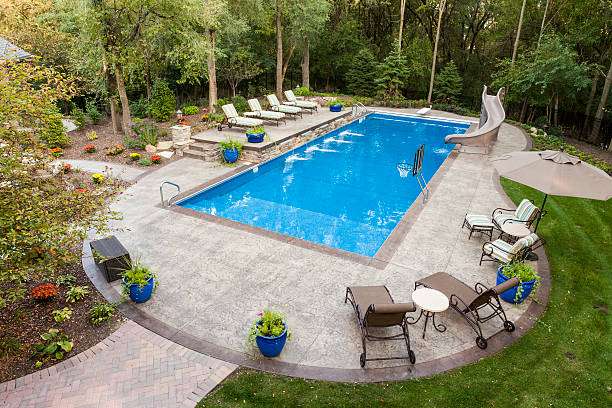
Types Of Pool Deck Pavers
One of the best features about pool deck pavers is the ability to customize. It is a virtual guarantee that you’ll find a paver that fits perfectly into the aesthetics of your home. Looking for some ideas? Consider the following types of papers.
Travertine Pool Pavers
These pavers are an excellent choice for the area surrounding your pool. They are a porous stone that provides a naturally non-slip surface.
Concrete Pool Pavers
These pavers are a great choice because they resist moisture, meaning they are easy to keep clean. They are also slip-resistant.
Pool Coping
Coping should be used to cap the edge of the pool. It is necessary if an inground pool is concrete.
Shell Pool Pavers
These pavers, made of ground shells, blend perfectly into a summer environment. They are durable and very beautiful.
Brick Pool Pavers
These durable pavers can provide an incredible vintage look around your pool.
Pool Deck Cost
A paver patio is cheaper than a wood deck. Additionally, a paver patio will end up saving you money in the long run as well. Wooden decks need to be replaced every decade or so. Besides a few minor repairs that may happen over time – repairs that would happen no matter what material you selected for your patio – paver patios require very little maintenance. If you care for your paver patio, it can last you over 25 years. Considering you will have to complete at least two wooden decking projects in this time, it’s easy to see why paver patios are you best bet for your pool deck.
The cost of your paver project very much fluctuates. The type of materials you choose, the location of the project, and the scale of the project will all impact how much the project will end up costing you. If you have special requests, or desire a very specific type of paver, your project may end up costing more.
If you are interested, you may contact Marco Pavers. for a free quote. Our experts can help guide you through the process. Obtaining a free quote can allow you to determine just how your pool deck paving project can fit into your budget.
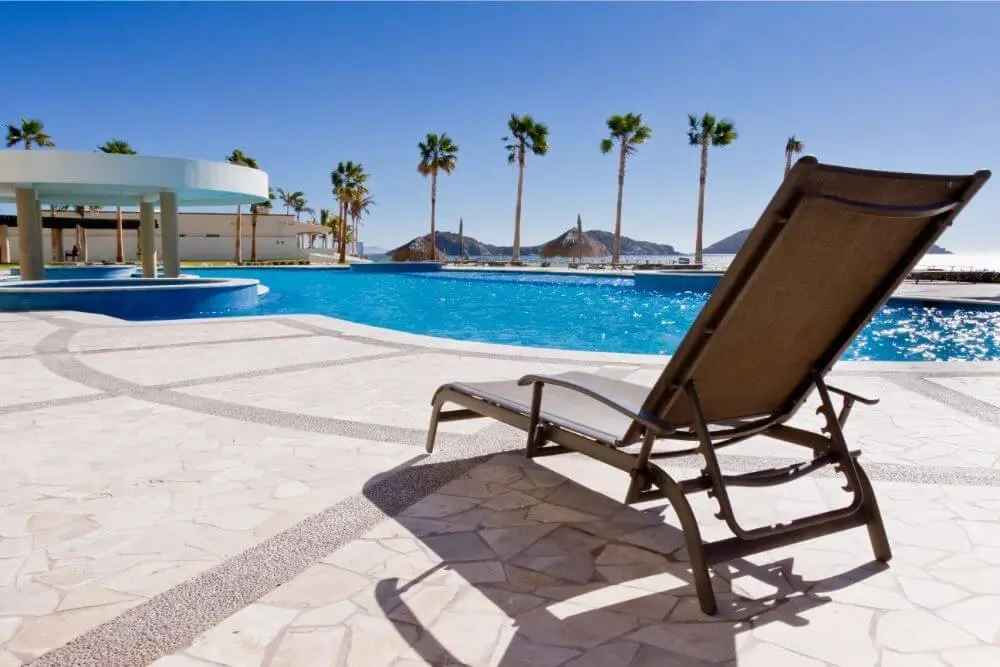
Pool Deck Repairs
Choosing pavers is a great option because the repairs that will eventually be necessary are minimal. No matter which material you choose for your pool deck, you will have to make repairs. If you choose pavers, you will typically only have to deal with root repairs and pool deck settlement.
Your pool deck may be susceptible to root repairs if the surrounding area is heavily landscaped. Roots can grow underneath your pavers, pushing your pavers up as they get larger. Not only does this look bad, but it can create a dangerous tripping hazard. Our paving experts can easily remove the troublesome roots and relevel the underlying surface to restore your pool deck in no time.
With frequent saturation and natural erosion, pool deck settlement is expected to occur, as the ground beneath your pool deck shifts. We can easily repack the surface and replace the sunken pavers to correct any pool deck settlement that has occurred.
It is also possible that when dealing with so much runoff and loose soil, drainage repairs may be necessary. The soil underneath your pavers can shift, impacting the effectiveness of your drainage runoff. It is also possible that the drains themselves may become damaged, either overtime or from a bad storm. If this is the case, you will need to complete drain repairs.
Fortunately, the experts at Marco Pavers can complete any repairs necessary for a reasonable cost. Properly completing these repairs can not only get your pool deck looking like new again in no time, but can also ensure its longevity. Completing repairs early can prevent further damage and more expensive repairs down the road.
Retaining Wall Design:
Working with Marco Pavers will allow you to perfect your retaining wall design. You may have a vision for your project in mind, which is great! But, be mindful that there are many factors that go into the design process because of the grades of slopes. You are ultimately designing a retaining wall to prevent runoff and erosion. By working with us, your project will be designed so that it will last for years to come. We will work with you to incorporate your vision into your project, providing you with the backyard of your dreams.
Once the plan is complete, we will mark the area in your backyard where work will be done, and ensure that the design meets local building codes and homeowner association regulations. We will then begin digging and laying stone, taking our time to ensure the wall is level while moving up the slope. Once the wall is complete, we will fill in the surrounding area with the chosen landscaping, providing you with a beautiful new backyard.
Types of Retaining Walls
There are many ways to utilize retaining walls in your yard.
Split Faced Retaining Wall
Split faced retaining walls provide a natural stone look while remaining extremely durable. Using split face stone can provide a rustic look to your retaining wall.
Freestanding Walls
Freestanding walls can work with your retaining walls, or stand on its own. These walls are textured on both sides. These walls do not hold back soil but instead, provide an enhanced decorative look. These walls can also provide seating in your backyard or on your paver patio.
Firepits
Stone firepits are easy to construct and can provide a great place to sit around and enjoy your backyard. Using stone can tie your firepit perfectly into your patio and retaining walls.
Anchor Retaining Wall
Anchor specializes in providing concrete retaining wall blocks. An Anchor retaining wall is sturdy and durable. With over 56 products available, you have plenty of options to complete your retaining wall project.
Retaining Wall Stones
There are many stones available for retaining wall use, coming in different shapes, sizes, colors, and patterns. Slabs of stone can also be used to construct your wall.
Columns
Adding stone columns to your retaining wall significantly improve the aesthetic appeal of your retaining wall. Columns can be used on retaining wall corners, or to break up a long stretch of wall. Columns can also contain wiring, allowing you to add lamps to your retaining wall.
Tremron Stone Gate Retaining Wall
These wall blocks are available in three unique shapes and sizes. They provide a weathered, cut-stone appearance. They are double sided, meaning they can be used as part of a retaining wall or a freestanding wall.
At Marco Pavers, we have years of experience working with these design options.
Retaining Wall Cost
There are many factors that can determine the cost of your retaining wall, including the height of the wall, the length of the wall, and the materials used. Typically, retaining walls range from $1,000 – $12,000, which is a small cost to preserve your home’s exterior landscape!
If you are concerned about cost, receive a free quote from Marco Pavers today. There is no harm or anything to be lost by receiving a free quote, as it will provide a lot of clarity about your project moving forward. We will work with you to design a project that meets your budget.
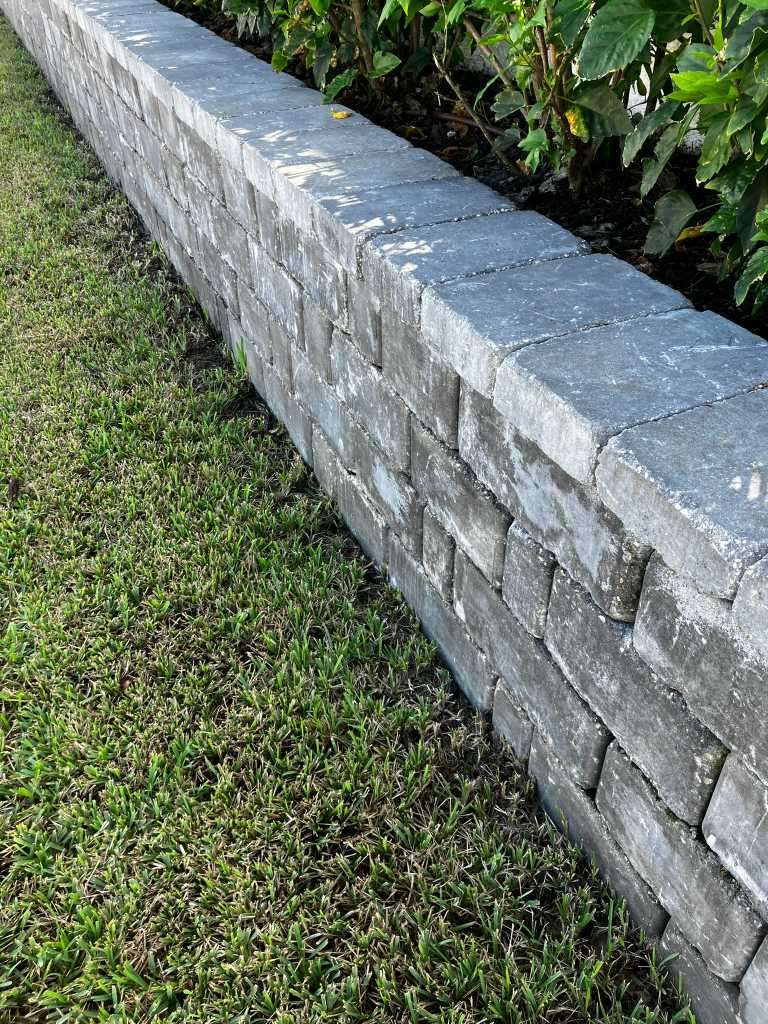
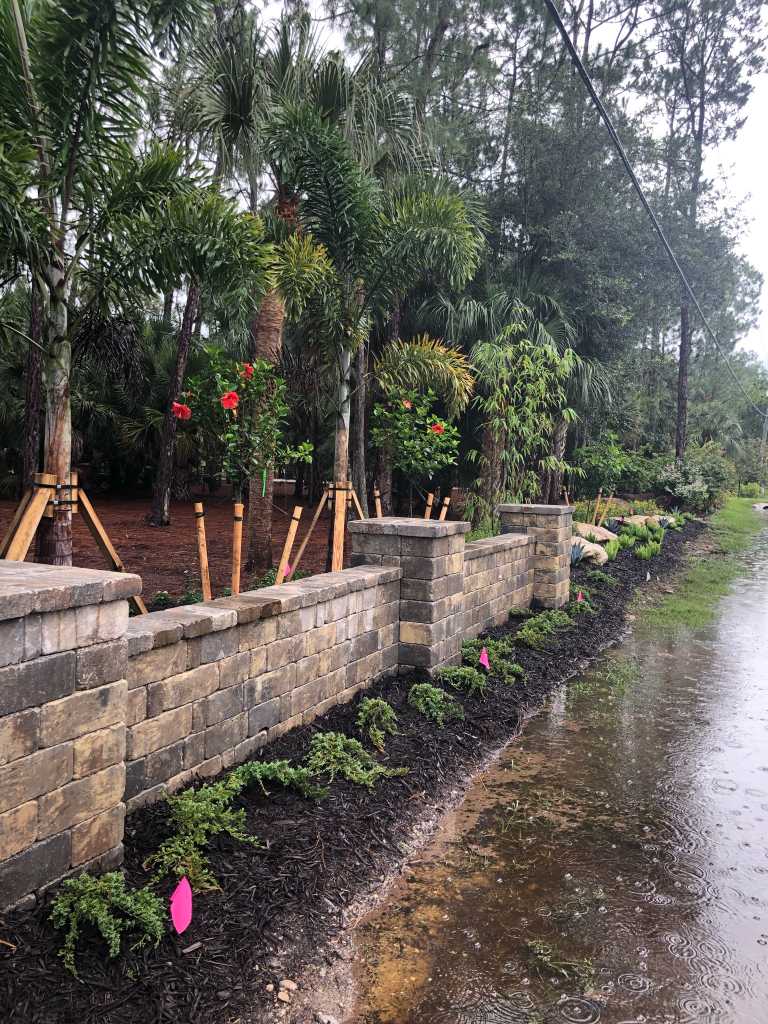
Retaining Wall Repairs
Retaining walls are installed to fight against the forces of Mother Nature. At Marco Pavers, we will build you a retaining wall that is durable and structurally sound. There are some things that may need to be addressed during the lifespan of your wall.
Because retaining walls are fighting against gravity and erosion, they may shift slightly over time. This is likely as the surrounding area – below and around your wall – settles over time. We can easily repair a retaining wall that has suffered from settlement.
Roots can also pose a problem to your wall. Vegetation can grow near your wall, making a root repair necessary. The roots from the vegetation can push against the stones in your wall, changing the structural integrity of your retaining wall. Our team at Marco Pavers will work to properly remove all underlying roots when we complete your wall, hopefully avoiding future root repairs.
Walkway Pavin:
Types Of Walkway Pavin
When designing your walkway, you will have plenty of walkway pavers to choose from. In fact, the options are so abundant that they can be overwhelming at times! If you’re unsure where to begin, consider the following walkway pavers when designing your walkway.
Brick Walkway Pavers
– Brick has been used for years as a walkway material. It is very appealing, and can provide a rustic or vintage look to your home. Brick pavers are made from clay. They are resistant to stains, and retain the color very well when exposed to the sun.
Running Bond Walkways
This bond is the most typically used bond. Each row of pavers overlaps by a half-paver.
Concrete Bond Walkways
By using a concrete bond, you can pattern your pavers in any way you’d like.
Stepping Stone Walkway Pavers
If you’re looking for a walkway in your yard that is practical but not overwhelming, consider these pavers. Stepping stone walkway pavers will save your lawn from being trampled, but will only use a few large stones that are strategically placed.
Not only do you have options when it comes to the type of pavers you want to use, but you can even specify how exactly you would like them placed.
Tremron Stone Gate Retaining Wall
These wall blocks are available in three unique shapes and sizes. They provide a weathered, cut-stone appearance. They are double sided, meaning they can be used as part of a retaining wall or a freestanding wall.
Walkway Paving Cost
No matter your budget, you will be able to find an appropriate walkway paver cost. Walkway paver costs vary depending on the work you choose to have done. For example, if you choose to have a winding pathway that requires curved pavers, your costs will be more than if you have a straight walkway. Our paving experts at Marco Pavers can work with you to design a walkway that meets your budget.
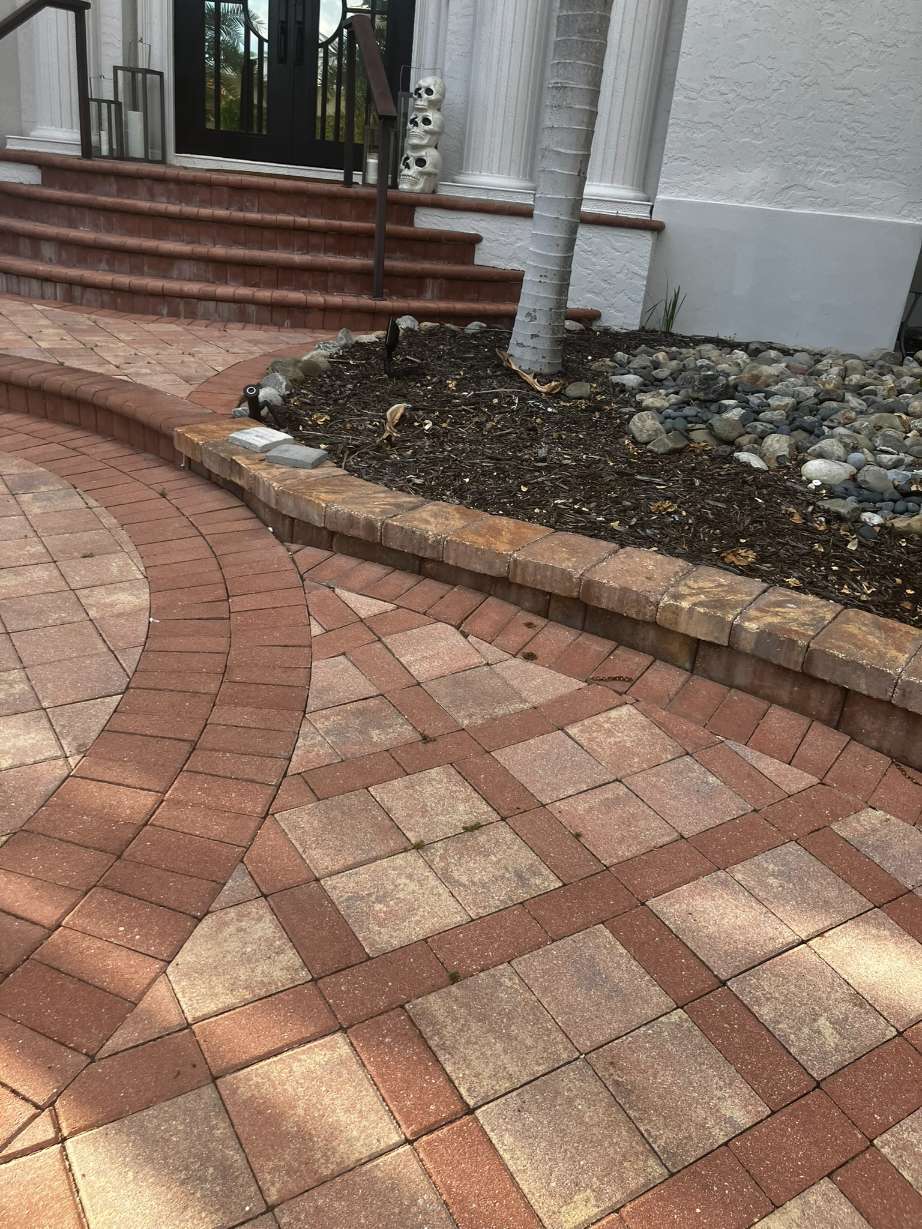
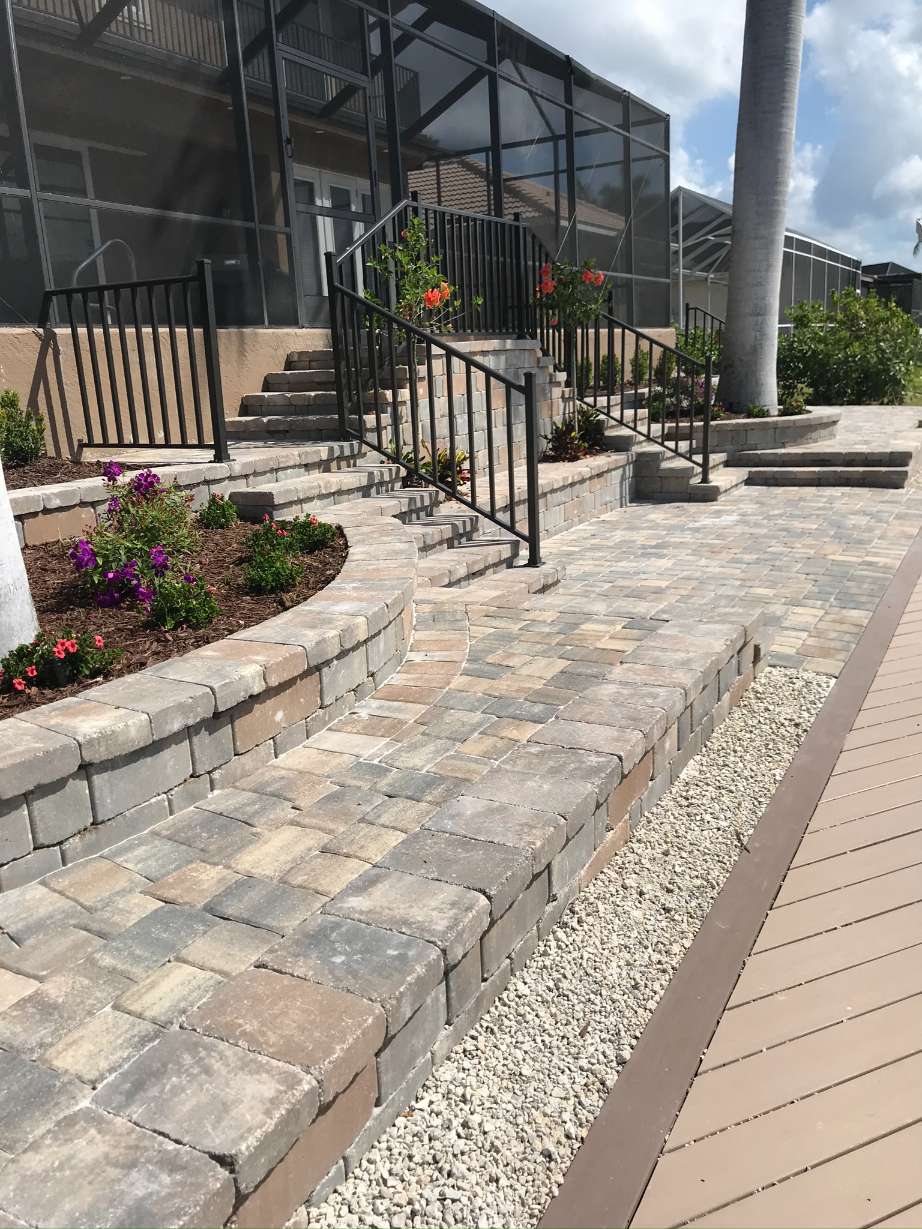
Walkway Paver Repairs
Pavers are remarkably easy to maintain, but they may require some repairs along the way. It is highly recommended that you take the time to maintain your paver walkway. If you properly care for your pavers, they can last for over 25 years. If you neglect the necessary repairs, you will be forced to deal with more expensive damage in the future.
Paver settlement is unavoidable but easy to care for. Over time, the ground beneath your pavers will shift and settle, causing your pavers to sink. By removing the pavers and repacking the base underneath, your walkway can become level again.
The constant foot traffic on your walkway can lead to shifting pavers. Allow us to come in and properly realign your pavers. One of the most effective ways to do this is to add a lip or edging that will keep your pavers in place. We can complete this project in a couple of hours and have your walkway or pathway full operational again.
It is also likely that your walkway is lined with beautiful plants and shrubs. While this may look great, it could potentially cause problems down the line for your walkway. Root repairs are required when roots from surrounding vegetation grow beneath your pavers and disrupt the base underneath, lifting your pavers up to create an uneven surface. Our experts at Marco Pavers can remove the root and relevel your walkway, immediately restoring its beauty.
Parking Lot and Roadway Design:
The paving experts at Marco Pavers can work with you to complete and parking lot design or roadway design that fits exactly what you are looking for. Once you have selected a design you are happy with, we will then explain the basic installation overview, which is typically completed in the following order.
First, our team will survey the area where the project will be complete. We remove any existing paving that you may have in place and excavate the land. Next, we will prepare the base layer, which will be determined based on the location of your project and the expected runoff. We will then install the pavers and tamp them down, ensuring a tight, compact fit.
Types of Parking Lot/Driveway Pavers
At Marco Pavers, we can recommend the pavers that are best for you based on your location and expected use of the project. Options to consider include
Concrete Pavers
These pavers are more durable than asphalt.
Heavy Vehicular Pavers
These pavers are thicker than average pavers, designed to hold heavier loads and more constant traffic.
Clay and Brick Pavers
These pavers are very strong and are aesthetically appealing. Contracting Color Parking Line Pavers – Instead of painting lines and ruining the look of your project, you can use contrasting-colored pavers.
Parking Lot And Roadway Cost
There are many options available to allow your parking lot and roadway paving project to fit both your budget and your style. Whereas other paving options are very generic and straightforward – what you see is what you get, and the cost is rather fixed – you can choose from different paver colors, patterns, and materials to help create your perfect project.
Your walkway paver costs will be determined on the types of pavers you choose and the work required to complete the project. For example, cutting curves into your pavers or placing your pavers in a challenging area can make your project more expensive. But because of their durability, pavers should be considered an investment. They require low maintenance, which will reduce your overall costs in the long run.
If you are looking to determine how a paver roadway or parking lot can fit into your budget, don’t hesitate to contact Marco Pavers. for a free quote. An experienced paver will come survey your area and give you quotes based on the various materials you have available.

Parking Lot and Roadway Repairs
If you have already installed pavers on your roadway or parking lot, congratulations! You have made a smart investment. You may have noticed that over time, your pavers have become uneven as they settle. Root repairs and paver settlement are expected over time and are unavoidable. This would be the case no matter which type of driveway you choose, but when choosing pavers, these are the only repairs that you will typically have to deal with.
Fortunately, our team at Marco Pavers can easily help with your paver repairs. Root repairs are necessary when roots from plants grow underneath the surface, disrupting the base your pavers are laid on. Paver settlement and drainage repairs are required when the ground underneath your pavers naturally shifts over time.
If you are installing a driveway, working with Marco Pavers can allow you to minimize your paver repairs down the road.
Pavers Repair
Paver Driveway Cost
Your paver driveway cost should be seen as a worthwhile investment for your home or business. A paver driveway is not only aesthetically appealing but offers incredible strength – 9,000 pounds per square inch. Your paver driveway cost should be considered an investment because there are not many maintenance costs, but the driveway will be extremely durable for many decades. A paver driveway will outlast concrete and asphalt. A paver driveway can increase the value of your home, as well.
A paver driveway cost will be dependent on the size and scope of the project but typically costs a couple thousand dollars on average. Paver driveway costs are typically less than concrete driveway paving costs.
There is a multitude of factors to be considered when determining your driveway paving cost. For example, an asphalt driveway may be the cheapest option upfront, but it may not be the cheapest option in the long-term because of maintenance and upkeep costs. Asphalt driveways must be resealed every year or so. When factoring your driveway paving cost, you should consider the cost of the lifespan of your driveway, not just the initial project cost.
If you are curious about the cost, you can receive a free quote from Marco Pavers.
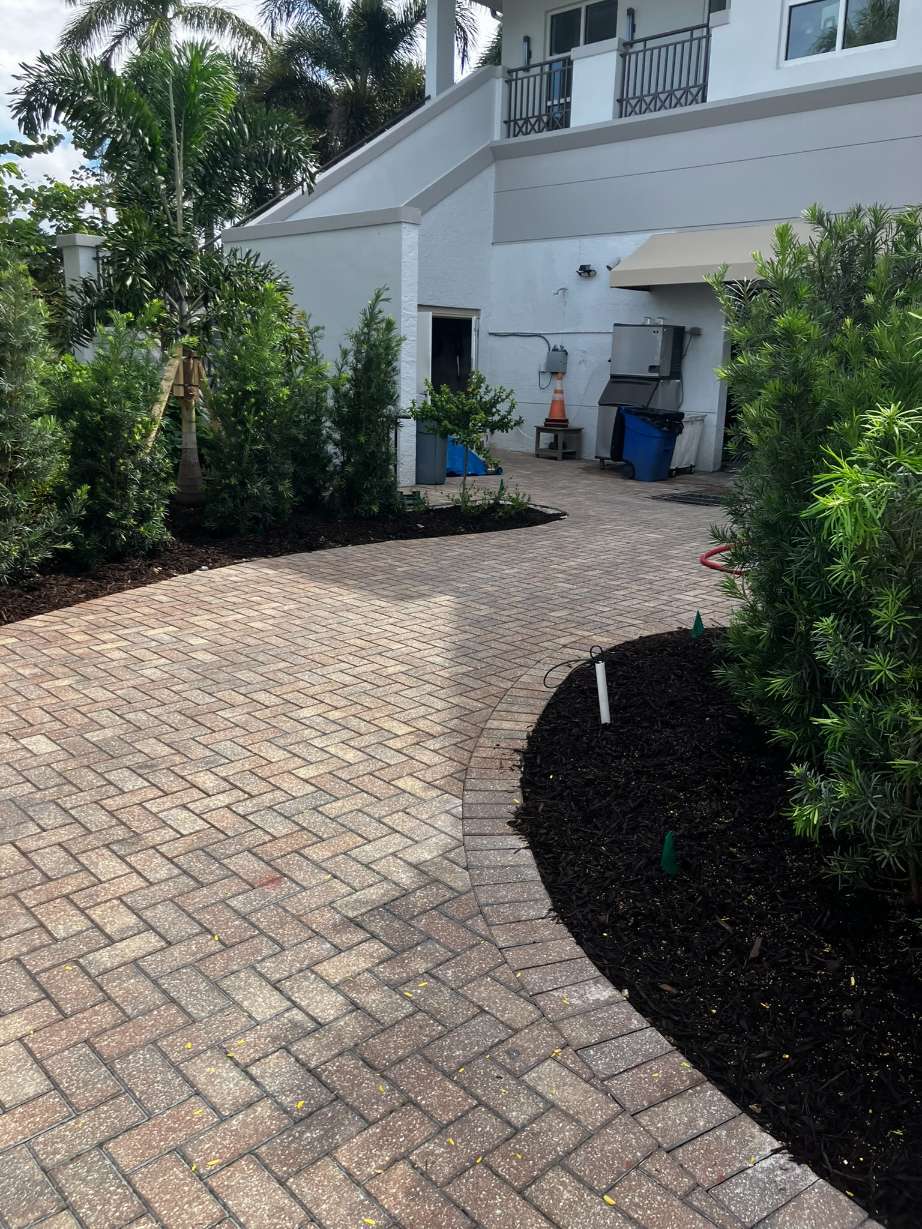
Marco Interlocking Pavers is the clear choice for all your paver repair needs. Some of the local paving companies frown at a paving repairs job. They look at them as they are too small or too difficult. Sometimes it’s hard to get them to come out and even look at them. We at Marco Interlocking Pavers embrace paver repairs. We have experienced and train technicians that know exactly how to get thing fixed right the first time. We fix all types of paver problems. These include the following and more:
Settled pavers
Damaged Concrete restraints
Stained and Broken paver replacement
Drainage / Deco drain repairs
Step Repairs
Pavers lifted by roots
Loose and shifting pavers
Sewer pipe/ irrigation leaks under pavers
Retaining Wall repairs
Coping Repairs
Let us know if we can help you. Request a quote today.
Paver Sealing Installation:
Paver sealing installation involves applying a sealant to your pavers to protect them from the elements, stains, and general wear. It also helps to enhance their color and make them easier to clean. Here’s a general guide to the process:
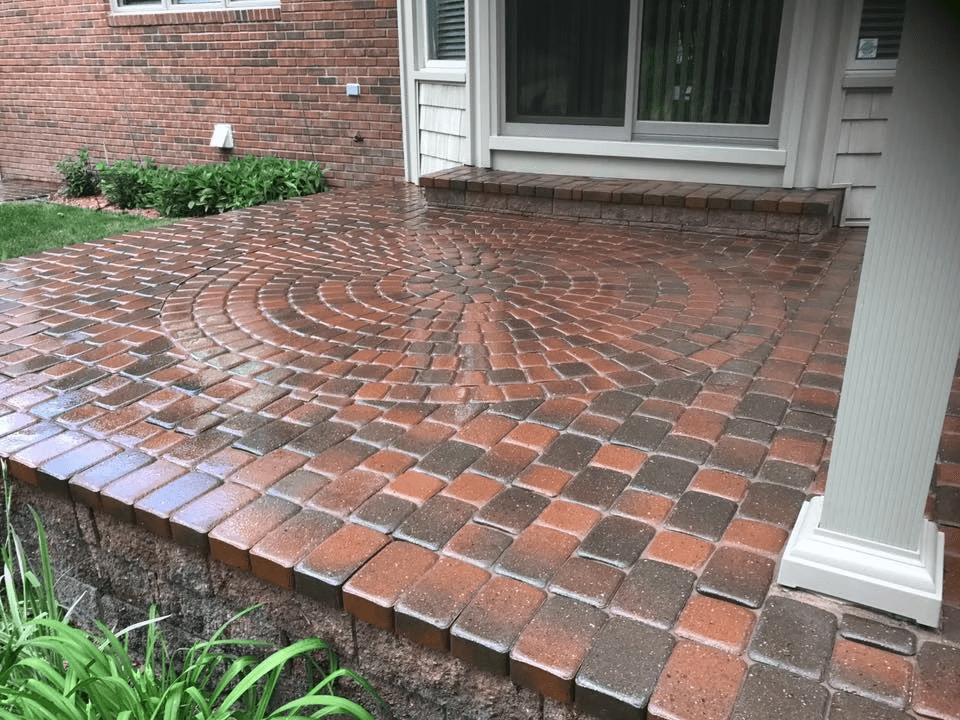
1. Cleaning the Pavers
Before sealing, you need to thoroughly clean the pavers. This involves removing any dirt, debris, moss, or algae. You can use a pressure washer for this or a specialized paver cleaner. Make sure the pavers are dry before proceeding to the next step.
3. Choosing the Right Sealer
There are two main types of paver sealers:
Wet Look Sealer: Adds a glossy finish and enhances the color of the pavers.
Natural Look Sealer: Offers protection without changing the appearance of the pavers.
You can find either solvent-based or water-based sealers. Solvent-based tends to be more durable but may have a stronger odor and require longer drying times.
5. Drying Time
Let the sealer dry completely, usually about 24 hours, before using the area. Drying times can vary based on temperature, humidity, and the type of sealer used.
2. Repairing Any Damages
If there are any cracked or broken pavers, it’s essential to repair or replace them before sealing. The sealant won’t fix these issues, and the surface won’t be properly protected.
4. Applying the Sealer
Use a roller or a sprayer to apply the sealer evenly across the surface of the pavers. Make sure to apply it in thin coats and avoid over-saturating any areas.
Work in small sections to ensure you’re not letting the sealer dry before spreading it out.
6. Maintenance
After sealing, it’s important to maintain the pavers by cleaning them regularly and reapplying the sealer every 1-3 years, depending on exposure to the elements.
Would you like more specific details about the process or recommendations for particular sealants?
Pervious Pavers Installation
When installing pavers, it’s important to follow a few key steps to ensure a long-lasting, stable surface. Here’s a general guide to help you with the process:
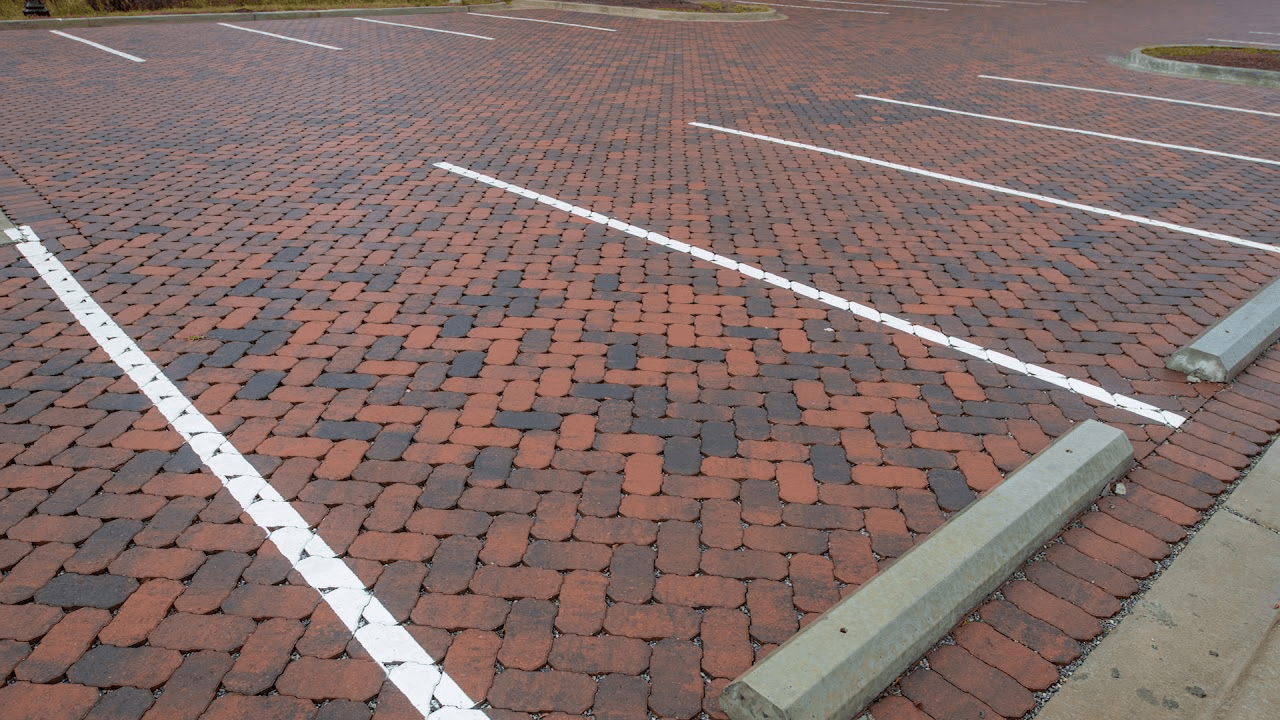
1. Planning & Preparation
Measure the area: Determine the size of the area you want to pave and make sure you have enough pavers to cover it.
Choose the right pavers: Select pavers that suit your style and usage needs (driveway, walkway, patio, etc.).
Check the slope: The surface should have a slight slope (about 1/8 to 1/4 inch per foot) for proper
3. Base Layer
Add a crushed stone base: Spread 4–6 inches of crushed stone or gravel evenly across the surface. Use a plate compactor to compact the base to ensure a stable foundation.
Add a layer of sand: A 1-inch layer of sand helps level the pavers and provides a cushion. Use a screed board to level it.
5. Compacting and Sanding
Compact the pavers: Once the pavers are laid, use a plate compactor to gently compact them into the sand.
Add joint sand: Spread a fine sand over the surface and sweep it into the joints. Then, compact the surface again to ensure the sand settles into the gaps.
Final leveling: Sweep away any excess sand and check for any uneven pavers that need adjustments.
2. Excavation
Excavate the area: Remove the topsoil and any grass or debris. The depth depends on the thickness of the pavers and the base material.
Depth for a patio/driveway: Generally, 4–6 inches of base material plus 1.5–2 inches for the pavers.
Ensure proper grading: Make sure the ground slopes away from any structures to prevent water pooling.
4. Laying the Pavers
Start at a corner: Begin laying your pavers in a straight line, following your desired pattern.
Cut pavers as needed: Use a masonry saw or a paver cutter to trim pavers around the edges or to fit them in tighter spaces.
Leave small gaps between pavers: This allows for sand to settle in and keeps everything secure.
6. Sealing (Optional)
After installation, you can apply a paver sealant to protect the surface and enhance the color, especially if the pavers are exposed to heavy traffic or weather.
By following these steps, you should have a solid, durable paver installation.
